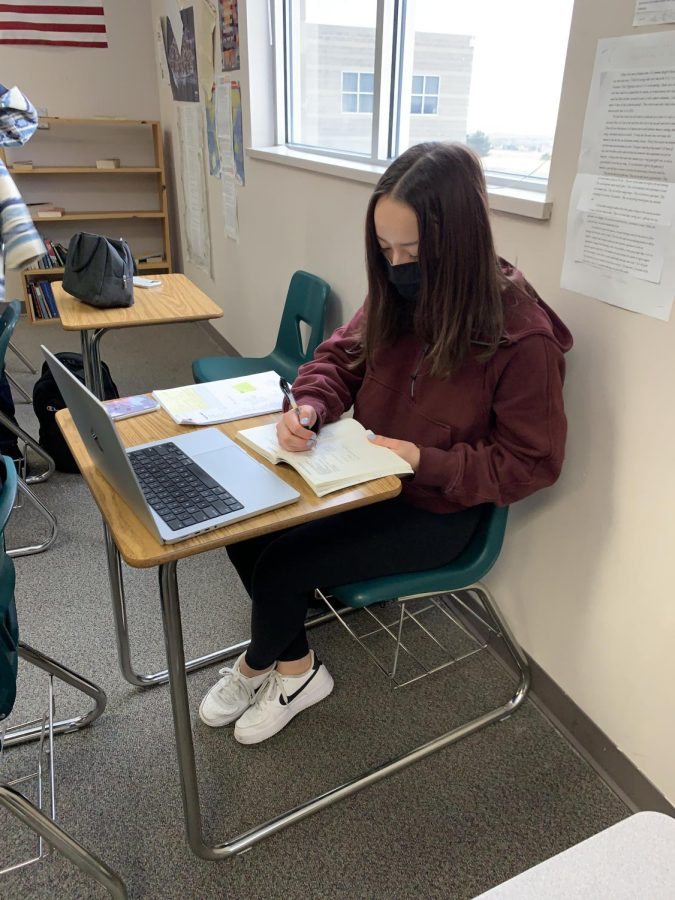OPINION-Are Students Overworked?
//Hannah Jenkins//
The American Education System. The foundation that builds young minds so that they may thrive in society.. that is, if it doesn’t break those minds first. Students, more specifically high schoolers, are constantly overworked to the point that it starts to negatively impact their mental health. Some may think that statement is dramatic, that the workload isn’t that bad. According to the National Center for Education Statistics, 19.4 million students are currently enrolled in public high school. What is life like in their shoes?
According to the School and Staffing Survey, the average high school student spends around six and a half hours in school per day for around 180 days out of the year. This means that a student spends approximately 1,170 hours at school per year. When you think about it, 1,170 hours isn’t that much; it equates to around 49 full days. However, this is just the time spent in school. This statistic does not include the time spent on homework each week.
According to a survey by the University of Phoenix College of Education, an average high school teacher assigns three and a half hours of homework per week. Since high schoolers can have up to seven or more classes, this means that an average high schooler has up to 24.5 hours worth of homework each week. If one takes the amount of time spent on homework each year and adds it to the amount of time spent in school, the outcome is 2,052 hours or approximately 86 full days spent on school.
Keep in mind, high schoolers have extracurricular activities, jobs, social lives and more going on in their day, which begs the question, how are they able to do everything and keep their sanity? The answer is they can’t.
In a survey done by the The American Psychological Associate, around 45% of teens said they were stressed by school and the pressures it puts on them. However, stress does have its benefits. In small doses, stress can motivate a person to complete a task with better efficiency while also helping them focus on the task at hand. Having said that, stress in larger doses can negatively affect a person’s health since excess amounts of stress are known to cause depression and anxiety. Physical symptoms, such as weakening the immune system, headaches, and fatigue are also caused by unhealthy amounts of stress. There are many ways to relieve stress, such as exercise, writing, spending time with loved ones and more.
However, the most common stress reliever is sleep. Sleep helps the brain relax after a long day, which is extremely beneficial in relieving stress. Teenagers should be embracing sleep; in reality, they are not. According to the Better Health Channel, teenagers are recommended to get around nine hours of sleep each night because their brains are still developing. Having said that, most teenagers get around six to seven hours of sleep each night due to homework and extracurricular activities. Lack of sleep has severe impacts such as depression, lack of concentration, anxiety and reduced school performance, all of which adds to stress teenagers already have from school.
Teenage mental health has been a hot topic in recent years, and it is not hard to see why. According to the National Survey on Drug Use and Health (NSDUH), 9.4% of teenagers, around 2.3 million, have depression. Symptoms of depression can include feeling hopeless, self-loathing, having a loss of interest in activities, and more. The NSDUH also mentioned that 70.77% of the teenagers said their depression caused severe impairment in their everyday lives. Around 25% of teenagers in the U.S. currently experience an anxiety disorder. Anxiety can be characterized as excessive worry about situations that will come across in everyday life. It’s really hard for one to enjoy their teenage years when they constantly are feeling down or afraid.
The massive amounts of work assigned to teenagers each night deprives them of much-needed sleep, which in turn results in depression and anxiety. The solution is simple: stop assigning students so much homework.
One may be asking, isn’t homework important? The answer is yes, homework does have its benefits. According to an article on the benefits of homework, homework helps develop time management skills and allows more time to process the information that the student had learned in class.
Having said that, three and a half hours of homework per teacher each week is extremely excessive. As previously stated, teenagers spend around six and a half hours at school each day, so why exactly is 24 and a half hours of homework each week necessary? Shouldn’t a teenager have enough time in class to complete the majority of the learning process? In other words, why should students lose sleep and mental stability over work they should have done in class? If a teenager were to have homework, would it be too much to ask for an amount that allows them to possibly have a job or an extracurricular activity without spiraling into becoming an anxious depressive mess? Many teenagers think that the American Education System cares more about assignments than a student’s mental health. The only way this belief can be changed is to reduce the amount of homework students have to do each night.








































